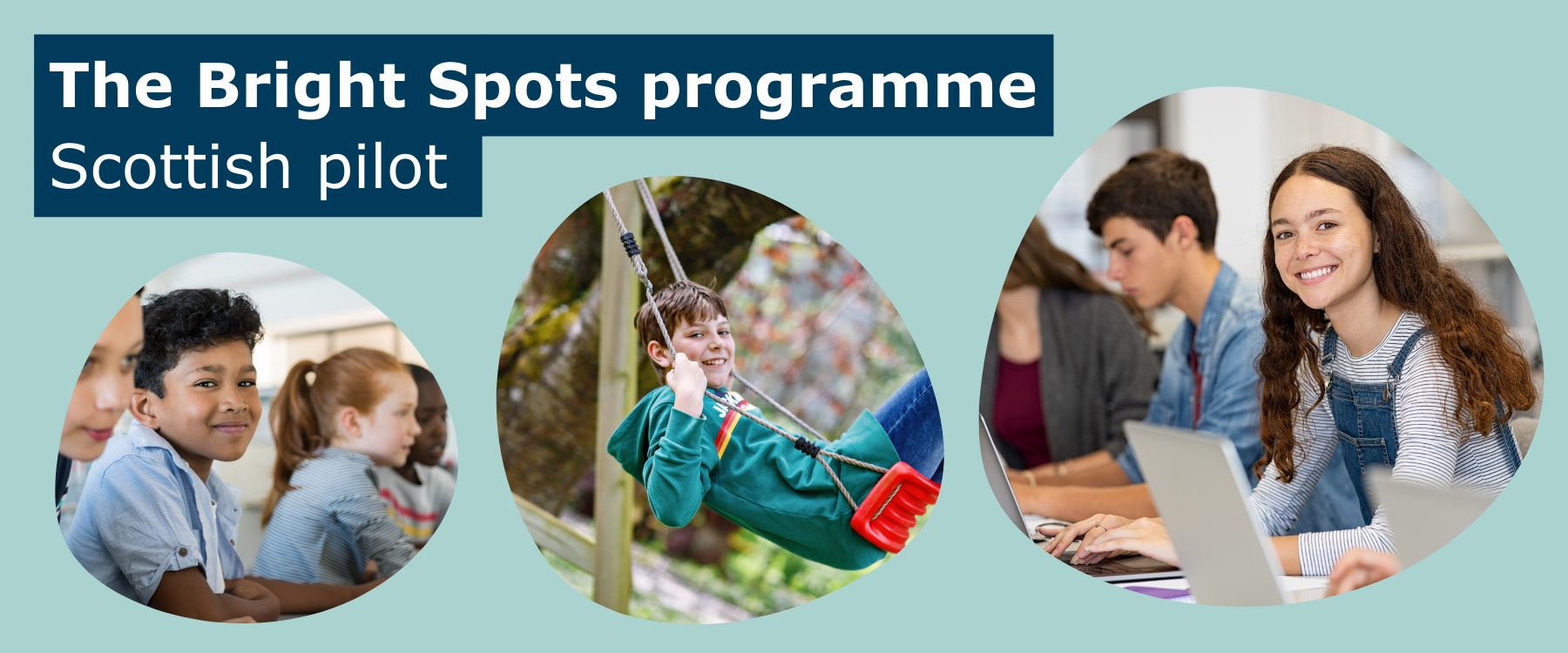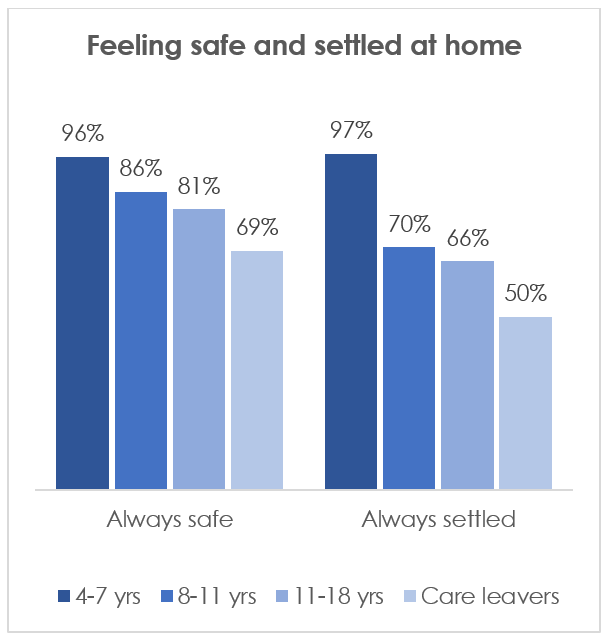
The Bright Spots programme Scottish pilot
CELCIS, in partnership with Coram Voice, is leading the Bright Spots programme Scottish pilot. The Bright Spots Programme supports local authorities with a new opportunity to listen to the voices of their care experienced children and young people about the things that are important to them.
Using the surveys, ‘Your Life, Your Care’, and ‘Your Life Beyond Care’, which have been developed to provide an opportunity for children and young people to share their experiences of care and how they feel about their lives, the local authorities can help to drive local service provision and focus on change where children and young people say it is needed.
The initial Scottish pilot commenced with three local authority areas – Aberdeenshire Council, Dumfries and Galloway Council and East Ayrshire Council - in 2021. The second pilot phase began in 2024 with three new partner local authorities: Aberdeen City Council, Scottish Borders Council and Stirling Council
These partner local authorities formed a partnership with CELCIS and Coram Voice to support:
- The delivery of the surveys
- Dissemination of the findings and learning
- Action planning to respond to what children and young people told local authorities in the surveys.
In 2020, Scotland's Independent Care Review reported that ‘Scotland collects data on the ‘care system’ and its inputs, processes, and outputs rather than what matters to the experiences and outcomes of the people who live in and around it’. By participating in the Bright Spots programme, local authorities have another opportunity to demonstrate that they are listening to care experienced children and young people, and this is informing services that impact on their wellbeing, care experienced, and throughcare and aftercare.
A report detailing the findings of both pilot phases will be published in due course. More information on the interim findings from the initial pilot can be found below.
Example findings: Feeling safe and settled at home; The impact on wellbeing for children, young people and care leavers
The Brights Spots programme surveys ask children and young people about a range of ‘wellbeing indicators’, such as relationships with important people in their lives, information about their care, school life, and hobbies. Combining the responses from the three Scottish local authority areas who participated in the initial pilot, one example of a key finding so far is the extent to which children, young people and care leavers feel safe and settled at home.
In total across the three areas there were:
- 105 responses from 4-7 year olds;
- 133 responses from 8-11 year olds;
- 261 responses from 11-18 year olds
- 218 responses from care leavers

These results show that the proportion of children and young people in and after care that feel safe and settled in their home declines as age increases, with just over two thirds of care leavers always feeling safe in their home, and only half of care leavers always feeling settled in their home.
When children, young people and care leavers were asked questions about wellbeing, such as happiness and life satisfaction, there were also clear differences between the proportions of children and young people in care aged 11-18 years and care leavers with low and very high scores. One in five to one in four care leavers had very high scores when asked about their happiness yesterday, feeling that the things they do are worthwhile, and life satisfaction, whereas one in three 11–18-year-olds in care had very high scores for each question. More care leavers had low than very high scores for each question, whereas more 11–18-year-olds in care had very high than low scores.

Having strong and supportive relationships and feeling safe and secure at home influence the wellbeing of children in care and care leavers. Factors most strongly associated with wellbeing for 11–18-year-olds in care were trusting the adults they live with and talking frequently with them about things that matter and feeling included in decisions made about their lives. For care leavers, having a person that listens to them, tells them they’ve done well, and who believes they will be a success were most strongly associated with wellbeing.
About the Bright Spots surveys
Using these surveys provides an effective measure of wellbeing, quality of care and leaving care experience. Informed by research and developed by Coram Voice and the Rees Centre at the University of Oxford with funding from the Hadley Trust, these capture the experiences of children from four years old up to the age of 25 through age-appropriate questionnaires.
The two surveys focus on:
‘Your Life, Your Care’
A survey for children and young people in care, which uses age-appropriate questionnaires (for ages 4-7, 8-11 and 11-18)
‘Your Life Beyond Care’
A separate survey for care leavers up to the age of 26
Children and young people helped to design the surveys, and children in care and care leavers shared their thoughts with researchers about what was important to them.
In England, Wales and Scotland to date, the two online surveys have been used by over 80 local authorities and received over 24,000 responses.
Read more about the Bright Spots work in England and Wales
The Bright Spots programme Scottish pilot short films
In these two short films, recorded in October 2022 and September 2023, two local authorities that where involved in the Scottish pilot and one local authority from England share their experiences of the Bright Spots programme.
Learning from the Bright Spots programme - October 2022
In this video, Micky Anderson, Data Lead at CELCIS, introduces the Bright Spots programme Scottish Pilot.
Grace Fletcher, Service Manager for Family Support and Young People at East Ayrshire Council and Andrew Dick, Social Work Manager for Corporate Parenting at Aberdeenshire Council discuss the reasons why they wanted to be involved in the Bright Spots programme Scottish pilot, the process of carrying out the surveys in their local authorities and learning along the way.
The film also hears from Toby Wilson, Team Manager for the Voice and Participation Team at West Sussex County Council in England, who discusses what’s been learned from carrying out the surveys over several years, and the impact the Bright Spots programme has had for children, young people and care leavers.
Making change happen: Reflections and impact from the Bright Spots programme Scottish pilot - September 2023
In this video, Grace Fletcher, Service Manager for Family Support and Young People at East Ayrshire Council and Andrew Dick, Social Work Manager for Corporate Parenting at Aberdeenshire Council, reflect on being involved in the Bright Spots programme Scottish pilot. Two years after applying to take part, they discuss the findings the surveys, changes that have taken place to improve the lives of children, young people and care leavers, and offer thoughts and reflections for local authorities thinking about applying to take part in the second Scottish pilot phase.


